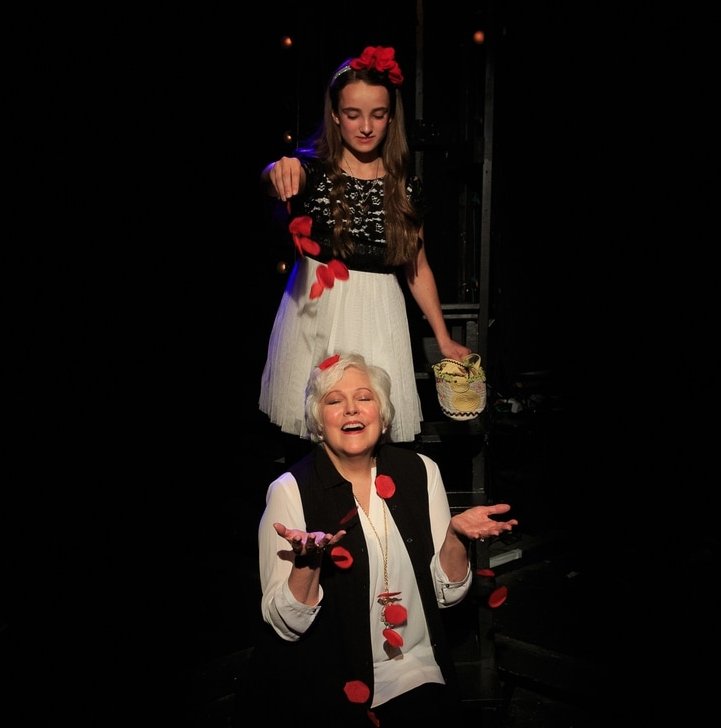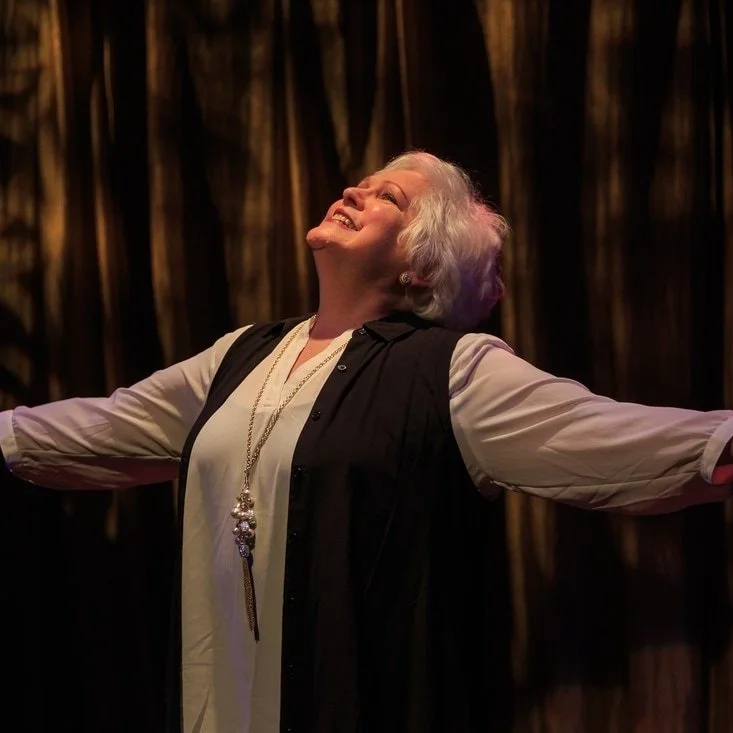A love letter to new work.
I've been doing a new musical about aging and memory loss. It's called Kaleidoscope and it's part of the Creative Cauldron's Bold New Works Series, and it's been wonderful and tricky and very moving. To quote one audience member, "it's big art in a small space." It stars Florence Lacey (look her up - she's a bona fide Broadway Star with capital letters and the most gracious woman I have ever met) and it's written by Matt Conner and Stephen Gregory Smith, beautifully arranged and orchestrated by Warren Freeman. This one has snuck into my soul and stayed there - I dream of the tears that run down Flo's face at the end; I see rose petals everywhere I look and I'm transported when the oboe plays. Catherine Purcell, who plays my sister, astonishes me with the beauty of her singing. And Miss Sophia Manicone is awfully sassy for one so young.
But it’s more than the work; it's the subject matter and how it's handled. The stages of life are represented by seasons; the repeated image and patterns and soaring musical themes evoke a long and fascinating but complicated life, and make the passage of time feel beautiful and dignified. It's funny and poignant, no easy feat. And just as in real life, sometimes reality seems a little murky. It's a non-linear work that addresses this difficult subject matter in a graceful yet honest way. We see ourselves reflected onstage - and there's nothing more human than aging - we're all doing it, all the time.
Mommy and me
I am. And so is my mother. She's had an up and down year with her health; thank heaven things are very "up" right now. She saw Kaleidoscope twice (now that's a theater mom!). She said I was great (thanks, Mom) and she gushed about everybody. But it was Flo who truly captured her imagination. As we left the theater after viewing #2, Mom said to me, sort of sideways, "What do you think about letting my hair go to my natural color, like Flo's?" (As you can see from the pictures, Flo's hair is stunning.) Now I have been on my mom to stop dyeing her pixie cut for years, but it took a musical to get her to commit. She could have gotten weepy and worried, given the subject matter. Instead, she identified with the vibrant, compelling woman we see at the beginning of the piece, and fell in love with her hair.
Beautiful Flo
After every show we have a talkback with the audience; they're a good way for actors and audience to connect. But I can't tell you how extraordinary these particular sessions have been. Almost the entire audience stays every night, and they're not asking the usual questions, like how did Flo get her start and become famous (although that is a great story!). They want to share their stories, and they do, almost to a person. They feel so safe in the big art-small space setting that will tell us, with great bravery, of their father or mother's last days, about the moments of clarity, about the hilarity of a bra worn over a shirt or how music was the only thing brought them comfort. Alzheimer's professionals speak; we hear how emotion stays with us even if cognitive recognition is no longer in place. And almost every night, someone describes symptoms, looking for help. We privileged to empower these people to speak through theater; we're privileged to hear their stories.
After all, sharing stories is what it's about. It's how we communicate. I see it at UrbanArias, too: I sit on the board of a small opera company that does new work in DC. I've watched them produce (and helped, a little) 20 new works in their short time, including commissions. The company is doing a new opera in the next weeks about race relations called Independence Eve at Signature Theatre, another champion of the new (thanks Signature!!): it shows us three fraught meetings, from the civil-rights era to present-day, between a white tenor, Brandon Snook, and a black baritone, Jorell Williams, and while it's an "issue opera," the way the issue is handled is anything but expected. If that's not timely and tricky I don't what is. i have no doubt this one will engender many important, tough but hopefully illuminating talkbacks of its own.
My friend Robert Wood, UrbanArias' Executive and Artistic Director, writes in his blog (read it; he's super-eloquent), "the arts generally, and opera specifically, must be “relevant” in order to survive." Music theater can struggle to be relevant; sure, sometimes it just needs to be escapist and fun and that's ok too. But Flo wisely remarked the other day, "sometimes I go to the theater for a good cry." Me too. Life's difficulties and beauty move us to tears, differently but in equal measure, and that's relevance.
So if you hear of a company near you prodiucing new work, support it in some way if you can. (DC is a hotbed of new work!) As Nicholas Kirstof said in his recent Times article about cuts at the NEA "the arts humanize us and promote empathy. We need that now more than ever." Amen.
My Flo
Family





